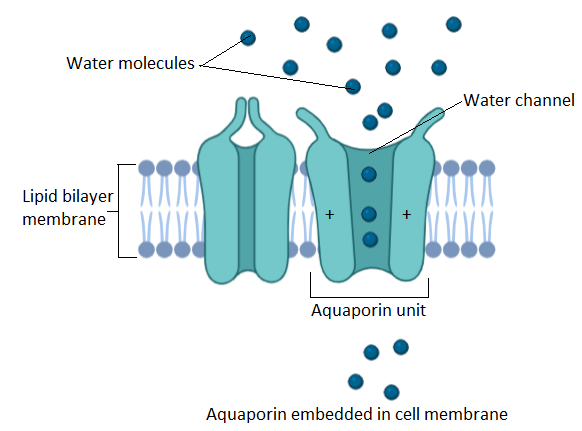
Water channels are
A. Made up of eight similar types of aquaporins
B. Involved in active transport
C. Involved in facilitated diffusion
D. More than one option is correct
Answer
564.6k+ views
Hint: The cell membrane of cells has minute channels that allow water to move across the membrane rapidly. This prevents solutes from entering the cell. Also, the penetration of certain ions is prevented through these channels. These water channels are made of specialized proteins that have different pore sizes.
Complete answer: The cell membranes have water channels embedded in them that are made of a specialized protein called aquaporins. Aquaporins are channels or pathways through which water molecules are able to move across the cell membrane at a fast rate. Aquaporins are the integral members of pore proteins and help in the selective conduction of water molecules inside and outside of the cell. Along with the water movement aquaporins also ensures the prevention of penetration of unwanted ions.

The water diffusion through aquaporins is facilitated diffusion. This means the type of diffusion of solutes that occurs through proteins in the plasma membrane. It is a passive type of transport because the solute moves down the concentration gradient. The polar water molecules find it difficult to pass through membrane lipids in the cell membrane is hydrophobic in nature. Thus, a transport protein is required for their passage across the cell membrane. The aquaporins are these transport proteins that diffuse water across the cell membrane. Diffusion occurs at a fast rate due to these proteins. These are of eight types having different pore sizes and diffusion rates.
So, we can conclude that more than two options are correct for the given question. Thus, option D is the correct answer.
Note: Aquaporins belong to a large channel protein family of major intrinsic proteins. Peter Agre discovered the aquaporins and received the Nobel Prize for this in 2003. Several human diseases are associated with genetic defects in aquaporin producing genes. Nephrogenic diabetes insipidus and neuromyelitis optica are two diseases associated with defective aquaporins.
Complete answer: The cell membranes have water channels embedded in them that are made of a specialized protein called aquaporins. Aquaporins are channels or pathways through which water molecules are able to move across the cell membrane at a fast rate. Aquaporins are the integral members of pore proteins and help in the selective conduction of water molecules inside and outside of the cell. Along with the water movement aquaporins also ensures the prevention of penetration of unwanted ions.

The water diffusion through aquaporins is facilitated diffusion. This means the type of diffusion of solutes that occurs through proteins in the plasma membrane. It is a passive type of transport because the solute moves down the concentration gradient. The polar water molecules find it difficult to pass through membrane lipids in the cell membrane is hydrophobic in nature. Thus, a transport protein is required for their passage across the cell membrane. The aquaporins are these transport proteins that diffuse water across the cell membrane. Diffusion occurs at a fast rate due to these proteins. These are of eight types having different pore sizes and diffusion rates.
So, we can conclude that more than two options are correct for the given question. Thus, option D is the correct answer.
Note: Aquaporins belong to a large channel protein family of major intrinsic proteins. Peter Agre discovered the aquaporins and received the Nobel Prize for this in 2003. Several human diseases are associated with genetic defects in aquaporin producing genes. Nephrogenic diabetes insipidus and neuromyelitis optica are two diseases associated with defective aquaporins.
Recently Updated Pages
Master Class 11 Computer Science: Engaging Questions & Answers for Success

Master Class 11 Business Studies: Engaging Questions & Answers for Success

Master Class 11 Economics: Engaging Questions & Answers for Success

Master Class 11 English: Engaging Questions & Answers for Success

Master Class 11 Maths: Engaging Questions & Answers for Success

Master Class 11 Biology: Engaging Questions & Answers for Success

Trending doubts
One Metric ton is equal to kg A 10000 B 1000 C 100 class 11 physics CBSE

There are 720 permutations of the digits 1 2 3 4 5 class 11 maths CBSE

Discuss the various forms of bacteria class 11 biology CBSE

Draw a diagram of a plant cell and label at least eight class 11 biology CBSE

State the laws of reflection of light

Explain zero factorial class 11 maths CBSE




